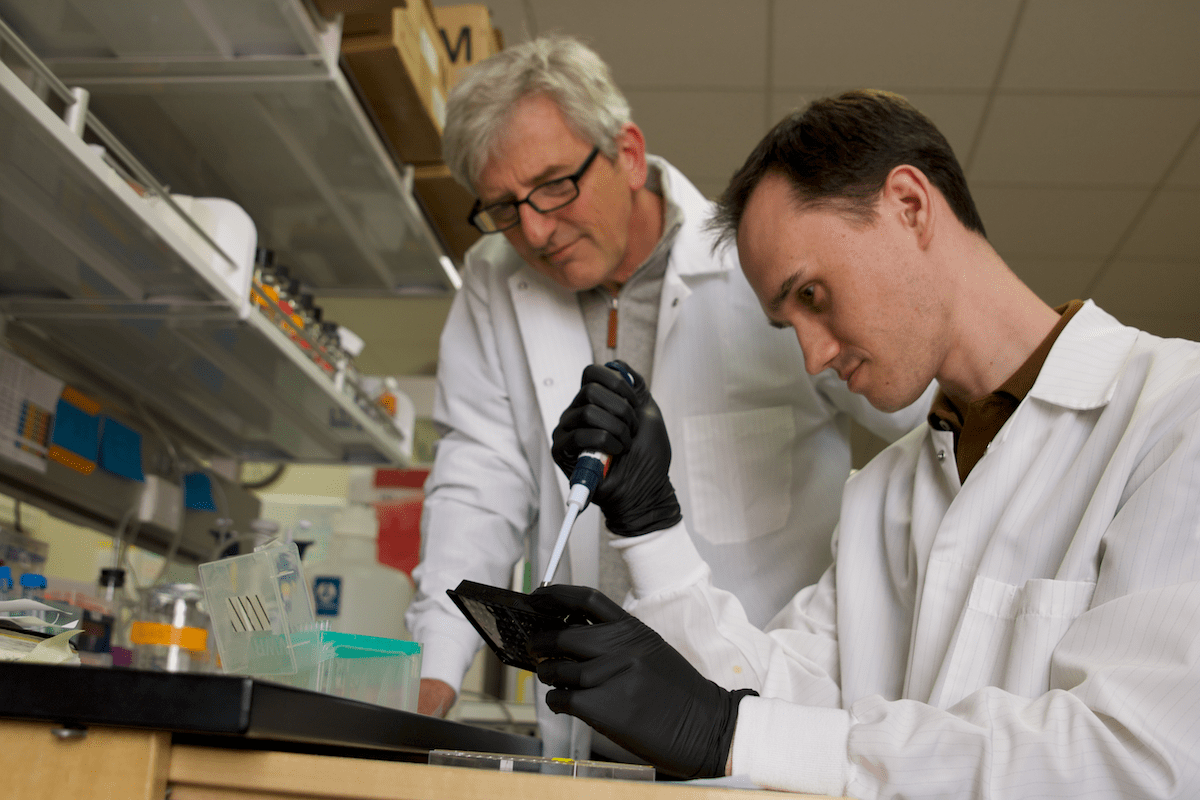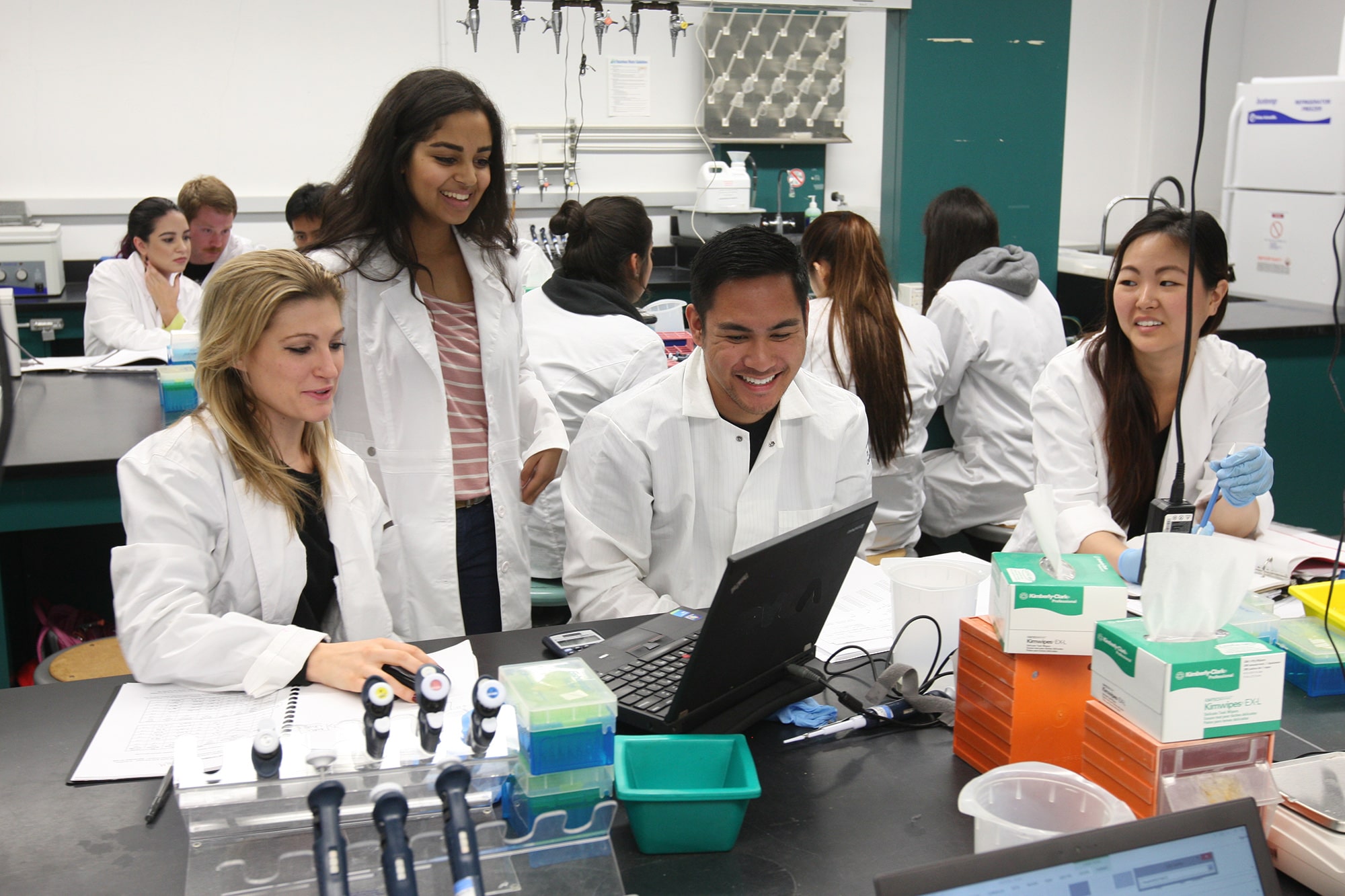This Major Encompasses Studies of Microbiology, Immunology and Virology
Microbiology and immunology are well-established disciplines within the life sciences. Microbiology addresses the biology of bacteria, viruses, and unicellular eukaryotes such as fungi and protozoa. Studies of microorganisms reveal basic information about processes in evolution, genetics, biochemistry, molecular biology, cell biology, structural biology, and ecology. Many bacteria, viruses, and protozoa cause disease in plants and animals. Hence, major areas of medicine and public health focus on these microorganisms.
Immunology encompasses efforts to understand how multicellular organisms have evolved to survive a variety of challenges to health and survival, including threats by pathogens and cancer cells. Basic questions of how immunity functions are entwined with a fundamental understanding of the consequences of microbial infection. Immunology also refers to the study of autoimmunity, the attack of the host by its own immune system.
The study of viruses (virology) is an important branch of microbiology that has contributed to our understanding of most of the fundamental processes in eukaryotic molecular biology, including the discovery of oncogenes. Viruses provide an excellent tool for the study of disease, cancer, and mechanisms of gene control. With the growing threat of emerging diseases and the potential for viral-based biological weapons, the study of virology was recently intensified and gained new perspectives.



Who Will Benefit From this Major?
The major has been designed to span the interconnected disciplines of Microbiology and Immunology, and because the scope of the disciplines is considerable, students have the opportunity to specialize within the major in one of three areas: microbiology, immunology, or virology. The curricula overlap considerably, but there are unique courses for each specialty. Students opting for the microbiology specialization can select from courses focused on prokaryotes (bacteria) or eukaryotes (parasites).The major is designed primarily for students who are serious about pursuing careers in microbiology and immunology and is intended to provide its graduates with the appropriate tools and training to successfully pursue professional and graduate degrees emphasizing these disciplines. These include Ph.D., M.D., and combined M.D./Ph.D. programs. Majoring in Microbiology and Immunology will also provide resources for serious students wishing to use a solid background in these disciplines for career goals in business, law, public and environmental policy, education, and other pursuits.
Undergraduate Major in Microbiology and Immunology
Microbiology and immunology are well-established disciplines within the life sciences. Microbiology addresses the biology of bacteria, viruses, and unicellular eukaryotes such as fungi and protozoa. Studies of microorganisms reveal basic information about processes in evolution, genetics, biochemistry, molecular biology, cell biology, structural biology, and ecology. Many bacteria, viruses, and protozoa cause disease in plants and animals. Hence, major areas of medicine and public health focus on these microorganisms.
University and School Requirements
All students must meet the University Requirements.
All students must meet the School Requirements.
Major Requirements
| A. Required Major Courses: | |
| BIO SCI M121 | Immunology with Hematology |
| BIO SCI M122 | General Microbiology |
| BIO SCI M124A | Virology |
| B. Upper-Division Laboratories: | |
| BIO SCI M116L | Molecular Biology Laboratory |
| and either | |
| BIO SCI M118L | Experimental Microbiology Laboratory |
| or BIO SCI M121L | Advanced Immunology Laboratory |
| C. Upper-Division Biology Electives: | |
| Select at least four from the following: | |
| BIO SCI E124 | Infectious Disease Dynamics |
| BIO SCI M119 | Advanced Topics in Immunology |
| BIO SCI M120 | Signal Transduction in Mammalian Cells |
| BIO SCI M124B | Viral Pathogenesis and Immunity |
| BIO SCI M125 | Molecular Biology of Cancer |
| BIO SCI M131 | Innate Immunity, Infection, and Pathogenesis |
| BIO SCI M137 | Microbial Genetics |
| BIO SCI M143 | Human Parasitology |
| BIO SCI M180 | Biotechnological Applications of Energy and Environmental Research |
| MOL BIO 205 | Molecular Virology |
| and two can be selected from the following: | |
| BIO SCI D103 | Cell Biology |
| BIO SCI D137 | Eukaryotic and Human Genetics |
| BIO SCI M114 | Advanced Biochemistry |
| BIO SCI M116 | Advanced Molecular Biology |
| BIO SCI M144 | Cell Organelles and Membranes |
Application Process to Declare the Major: The major in Microbiology and Immunology is open to junior- and senior-level students only. Applications to declare the major can be made at any time, but typically in the spring of the sophomore year. Review of applications submitted at that time and selection to the major by the Microbiology and Immunology Faculty Board is completed during the summer. Information can also be found at the UC Irvine Change of Major Criteria website. Double majors within the Charlie Dunlop School of Biological Sciences or with Public Health Sciences, Biomedical Engineering: Premedical, Nursing Science, or Pharmaceutical Sciences are not permitted.
Additional Information
The program is designed to allow students to move between the major and the general Biological Sciences major without penalty. Providing for such movement is necessary because a student will NOT be allowed to major both in Microbiology and Immunology and in Biological Sciences. A student may move into the Microbiology and Immunology major at any time during their third or even fourth years simply by taking Bio 116L as the prerequisite to the other laboratory courses M122L and M127L. These courses will not carry majors only restrictions, leaving the path to the Microbiology and Immunology major open to Biological Sciences majors even as late as the fourth year. However, the requirement to take M121, M122 and M124A means that students should begin taking these courses in the 3rd year if they are considering entering the major. Such late transfer might provide a path into the major for a student who does not meet the eligibility requirement based on their second year Bio and Chem GPA. Such a student could petition for entry based on their performance in the appropriate Bio courses during their third and/or fourth years.
Conversely, since the existing Bio Core beyond Bio 99 requires no set order in which the courses must be taken, and since M116L, M121, M122, M124A and the associated labs should be acceptable satellites for the Bio major, a student can move out of the major and into the Biological Sciences major at any time without penalty.
We encourage Community College and other transfer students to apply for entrance into the Microbiology and Immunology major. Transfer students may not be admitted directly into the Microbiology and Immunology major, but instead will enter UC Irvine as a Biological Sciences major and then change to the Microbiology and Immunology major once they have completed at least six of the required four-unit courses in Biological Sciences (minimum of two required in BioSci), Chemistry, Math and/or Physics (including labs and eligible electives) and earned a GPA of 3.0 or above in those courses. The basic principle is that to be eligible to transfer into this high level major, a student must demonstrate the ability to do B or better work in the field over an extended period of time.
In accordance with this principle, a UC Irvine student transferring from outside of Biological Sciences is also required to transfer initially into the Biological Sciences major. Subsequent eligibility to transfer into the Microbiology and Immunology major will be as described for other Biological Science majors.
| Course | Quarter | Instructors |
| M114 – Advanced Biochemistry4 | W | Poulos |
| M116 – Advanced Molecular Biology4 | S | Senear, Gershon |
| M116L – Molecular Biology Lab 1 | F, W, S | Herman |
| M119 – Adv Topics Immunol (prereq M121)3 | S | Lodoen, Walsh, Fruman |
| M120 – Signal Transduction 3 | F | Fruman, Walsh |
| M121- Immunology with Hematology 1 | F, W | Fruman, Walsh; Tenner, Hughes |
| M122 – Microbiology 1 | F, S | Ribbe, Lodoen |
| M122L – Microbiology Lab 2 | F, W, S | Sato |
| M124A – Virology 1 | F | Villarreal, Gershon |
| M124B – Viral Pathogenesis and Immunity (prereq M121 and M124A) 3 | W | Buchmeier, Lane |
| M127L – Immunology/Virology Lab 2 | S | Walsh, Bernard |
| M125 – Molecular Biology of Cancer 3 | S | Fan |
| M137 – Microbial Genetics 3 | W | James |
| M143 – Human Parasitology 3 | S | Morrissette |
| M144 – Cell Organelles and Membranes 4 | S | Glabe |
| M205 -Molecular Virology (Honors Program) | W | |
| H195A – Honors Viral EvolutionD103 – Cell Biology 4 | F, W, S | Villarreal |
| D137 – Eukaryotic and Human Genetics 4 | F | |
| D145 – Eukaryotic Genes 4 | S | Blumberg |
| E124 – Infectious Disease Dynamics 3 | F, W, S | |
| E176 – Co-evolution of Hosts and Parasites 3 | F |
1Required course for all tracks; 2One of these is required depending on the track ; 3Recommended electives for one or more tracks; 4Alternative electives.
The Microbiology and Immunology major does not diverge from the general Biological Sciences major prior to spring quarter of the second year.
Students interested in Microbiology and Immunology should normally enter UC Irvine as Biological Sciences majors and follow the basic Biological Sciences program during the first two years. Thus, prospective majors should take 94, 96, and freshman seminar (2B) in their first year along with Chemistry 1A-B-C and the associated labs, Chemistry 1LB-LC and the Humanities Core or one of the alternatives approved for the Biological Sciences major.
This should be followed in the second year with Bio 97, 98, 99 and 194S, and the introductory Bio lab, 100LW, together with organic chemistry (Chem 51 A-B-C and associated labs Chem 51LA-LB) and calculus/statistics (Math 2A-B and third quarter Math 2D or Math 7).
It is recommended that students take the Molecular Biology Lab M116L in spring quarter of sophomore year in order to gain further laboratory experience and satisfy the prerequisite for enrolling in M122L or M127L in the third year.
Students in their junior (3rd) year will take one of the laboratory courses M122L or M127L. Note that the lab course M127L is a combination of immunology and virology and used to be offered as separate courses, M121L and M124L. Students should also complete the physics series during the third year.
Students are strongly encouraged to participate in Bio 199 (independent research) throughout the 3rd and 4th years.
The remainder of the 3rd and 4th year curriculum is devoted to completion of the required six upper division elective courses, along with any UC Irvine breadth requirements that remain.
New courses have been designed for advanced students in the Microbiology and Immunology major. These include M119 (Advanced Topics in Immunology) and M124B (Viral Pathogenesis and Immunity). M119 and M124B have M121 as prerequisites and M124B also requires M124A. These courses involve both lectures and discussions of the primary research literature.
Program Contact
For questions or more information regarding this major, please contact:
Dr. Matt Inlay at minlay@uci.edu or Dr. Rachael Barry at rmbarry@uci.edu.
